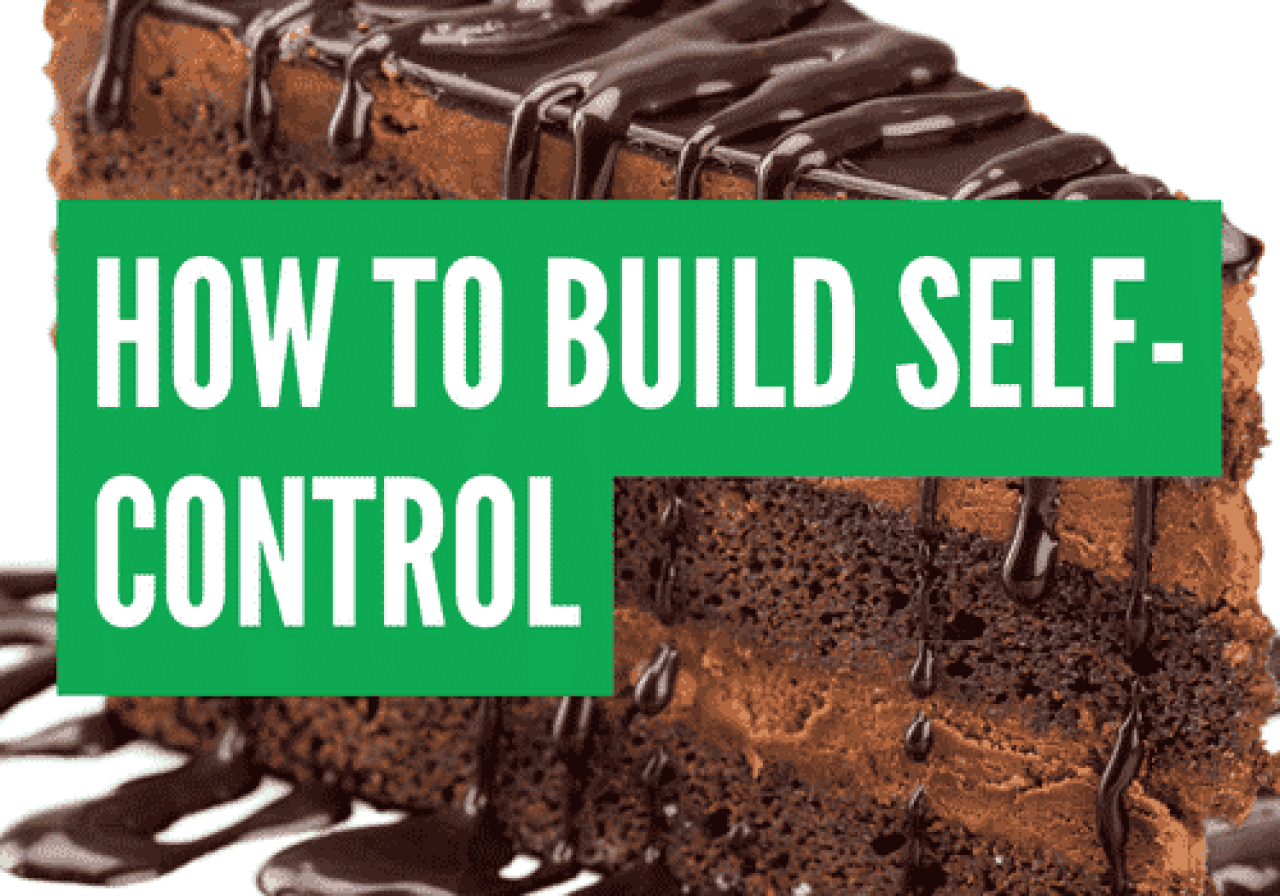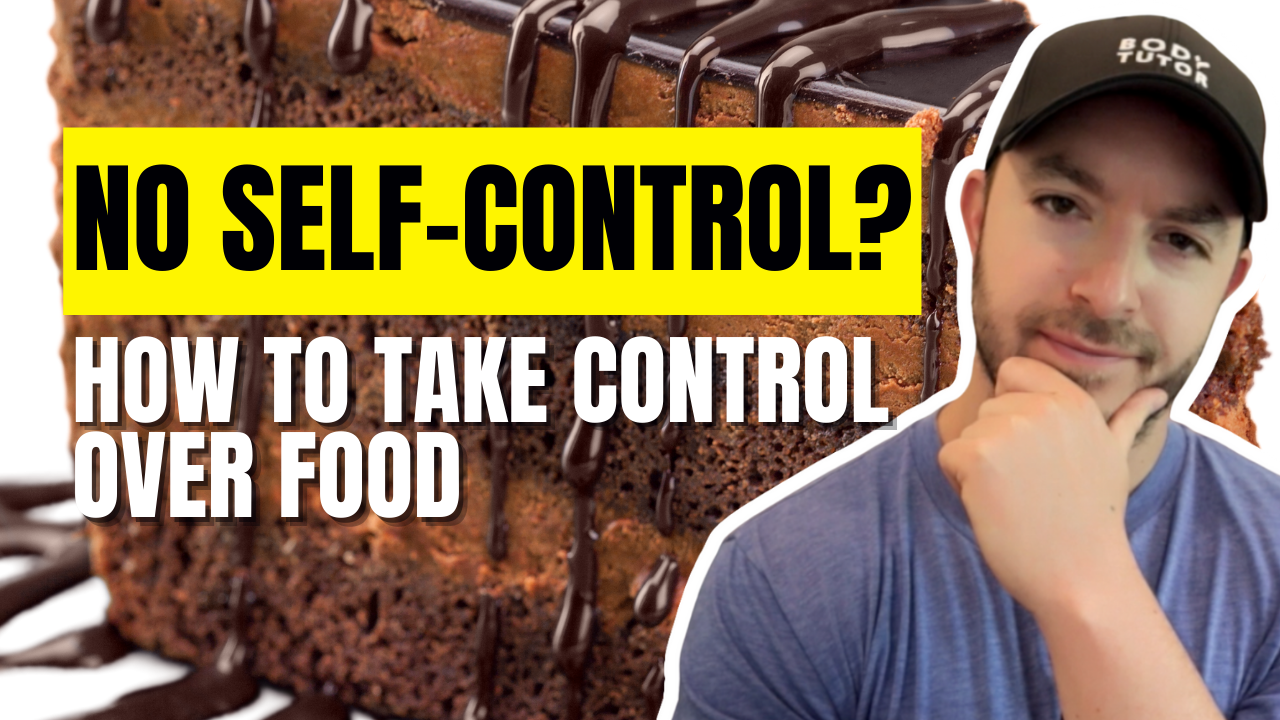
How to gain self-control over food (and lose weight)
So you want to eat less, but the food is just too good. (You know what I'm talking about.)
If you're like me, you probably have a lot of self-control when it comes to things like work, but not so much when it comes to things like ice cream and cookies.
But, you can learn new habits that will strengthen your self-control and help you get through those hard times when all you want is a scoop of salted caramel gelato.
So how do you gain control yourself around food so you can lose weight?
To get better at self-control, you need to do five things: set up your environment for success, eat regularly, plan ahead, get used to being uncomfortable, and question your hunger.
We're going to talk about all of these essential habits, but let's start with...
Set Your Environment Up for Success
Let's get down to the nitty-gritty of self-control. If you want more control over what you eat, you need to set up your environment in a way that works for you, not against you. And the easiest way to do this is to follow the rule "out of sight, out of mind." When something is out of sight, it is much easier for us to forget it entirely. But guess what happens when there are cookies on the kitchen table? You got it! You'll want to eat them.
Want To Hit Your Health & Fitness Goals Faster?
Our FREE email course is here to save the day! We'll send you 7 days of tips and strategies that are better than anything you've ever read.
So first, move the foods tempting you; that way, they don't keep calling your name. Get the cookies off the counter and put them on the top shelf of the pantry. Take that piece of cake that stares at you when you open the fridge and move it behind a gallon of milk.
If you have trouble avoiding certain foods when you are hungry or tired (or both!), place barriers between you and what's tempting you.
The opposite is also true. If you want to make eating healthy simple, make the foods you want to eat easy and convenient. So, instead of having sweets front and center, make apples or another fruit the star of the show.
Here's the deal. We put too much value on self-control. In reality, it takes much less willpower to stick to your plan when your environment (like your kitchen) is set up for success.
Show me someone who controls their environment, and I'll show you someone who doesn't have to rely on self-control.
P.S. You can watch Haley and I talk about each of these important habits in our video here.

Eat Regularly
It's a common misconception that the only way to lose weight is to starve yourself. In fact, one of the best ways to increase your self-control over food is to eat regularly—and not just at meal times! That way, when those sweet treats come around, which they always do, you'll be able to say "no" quickly and not get caught in an internal battle about what to eat. In my experience, resisting temptation is much easier if you've eaten and have the energy to choose the foods you want.
If you want to feel guilty and powerless, starving yourself to the point you have no self-control is the fast way to get there. But, if you want to feel powerful and happy that you made the right choice, then avoid the hunger trap.
Plan Ahead
There are a lot of ways to plan ahead and limit the amount of self-control you need, but here are three simple tips:
Tip #1. Set up a meal plan and grocery list for each day of the week. This way, you'll know exactly what you need from the store before heading out and can prevent impulse buys.
Tip #2. Prepare your meals in advance so that they are ready when hunger strikes. If possible, make double batches so that leftovers will last even longer.
Tip #3. Have a plan for when things don't go as planned (because things will eventually go south). My rule is to never beat yourself up about falling for temptation. When you feel that wave of guilt and shame wash over you, it only makes it easier for you to keep going down the wrong path. That's why it's so important to brush it off and get right back on track.
Listen, our success stories aren't successes because they were perfect. They got to where they wanted by learning to get back on track faster and faster each time.
You gave in to temptation. I get it. But now it's time to get over it.
Grow Your Tolerance for Discomfort
I know that discomfort is one of those things we all want to avoid. But the fact of the matter is that one of life's most important skills is our ability to accept short-term discomfort in order to gain long-term pleasure.
In other words, what is absolutely essential is developing the ability to push through discomfort to reach your goals—even when you don't want to do it right now or when the outcome seems uncertain. This can apply to anything—from exercise and dieting to work meetings and making YouTube videos (I should know).
At times, our cravings for food can seem so strong that we may feel like we have no control over them. But what if I told you that you could train yourself to depend less on food by building your tolerance for discomfort. If you can handle discomfort, it will be easier for you to avoid buying sweets the next time you go shopping or to pass on the chocolates when you get home after a long and stressful day.
But, building your tolerance for discomfort isn't one of those things that is best done alone. It's always easier to do something when you have someone with you. And if that sounds like what you need, join our one-on-one coaching program. We'll help you each and every day.
Question Your Hunger
Eating is one of the most common ways for us to deal with stress. It's easy to understand why eating feels good. And we've been conditioned from a young age to associate food with comfort, whether it's because of how it tastes or how it makes us feel. However, this can be an unhealthy habit when you're trying to lose weight because it can easily lead you down a path of emotional eating.
If you're not sure if you're hungry physically or emotionally, ask yourself, "Do I want a specific food?"
Sometimes we crave something that sounds good but really isn't what our bodies need at all (e.g., pizza). If this happens to you often enough and affects your health negatively in any way—or even just makes you feel guilty—it might be time for some self-reflection on what exactly it is that makes these foods so appealing and how they make you feel afterward.
Read "What to do when you’re not hungry, but want to eat" to learn more about emotional eating and how to stop it.
Conclusion
Having self-control over food is not about being perfect. Becoming more self-disciplined doesn't mean following every one of these habits exactly as outlined—it means taking the time to find out what works for you and making it happen!
Gaining self-control is a process, and you are in charge of your own journey. The most important thing is to keep trying new things until you find something that works well enough to stick with.